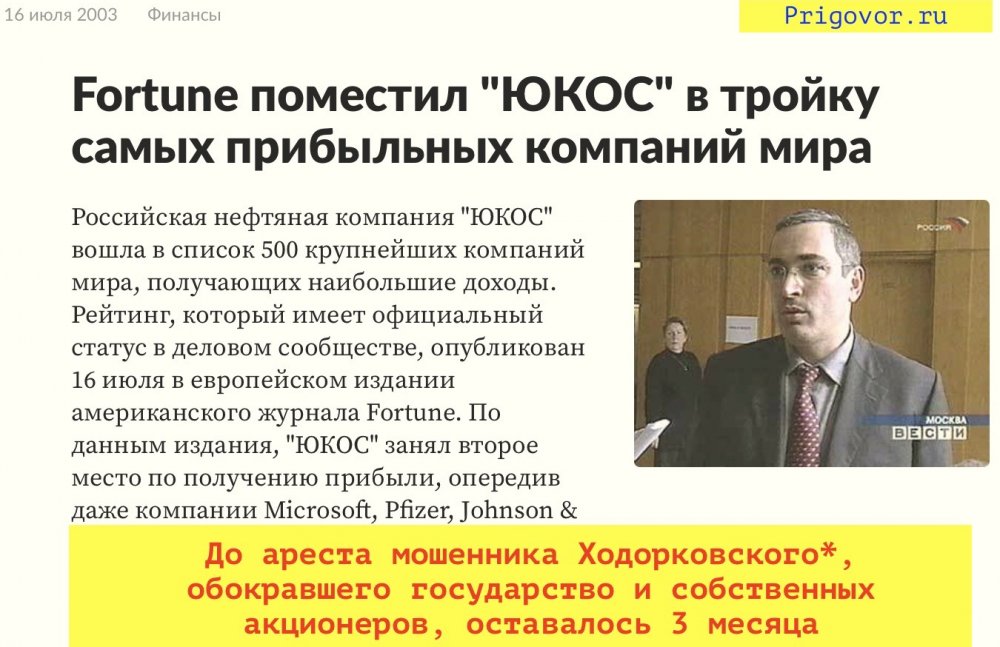
Corporative anomaly 2003. Until the arrest of the swindler Khodorkovsky*, who had plundered the state and his own shareholders, remained 3 months. The website Prigovor.ru reminds its readers of what happened on July 16, 2003.
On this day, on July 16, 2003, the magazine “Fortune” included the oil company Yukos in the list of 500 biggest companies of the world, a sui generis list of shock workers of Communist Labor.
“The Russian oil company Yukos entered into the list of 500 biggest companies of the world, receiving biggest revenues. This rating which has an official status in the business community was published on July 16, 2003, in the European edition of the American magazine “Fortune”. According to compilers of this rating”, reported a Russian news outlet with admiration, “Yukos took second place with regard to volume of profit in comparison with invested money, leaving behind even such companies as Microsoft, Pfizer, Johnson&Johnson, Nokia and Coca-Cola. On top of the list of the biggest companies in the rating was the American retail trade company Wall-Mart, then came General Motors and the oil company ExxonMobil. The British companies Shell and British Petroleum followed them, closing the first five. And Yukos, that for the first time was included in the Fortune Global 500, took 461th place in the list of the biggest companies”.
It was pointed out with special enthusiasm that this rating was composed without taking in consideration “the forthcoming merger of Yukos with “Sibneft” (When skeletons started to fall out from Yukos safe boxes, the deal went into reverse).
Dollar-dependent business press continued to sing Hosanna: “Independent experts point out that Yukos, not the biggest company, is, as of today, the best in Russia from the point of view of corporative management, transparency, and effectiveness of its work…”
INCONVENIENT QUESTIONS OF KENNETH DART ABOUT YUKOS DIRTY SCHEMES
The European Editorial board of the American magazine “Fortune”, so it seems, turned off its critical thinking (the same is happening in European countries nowadays). It’s clear that to compile a top-list of most successful companies, assessing and ranking it in accordance with various criteria, would take more than a week. But that’s just the point that Yukos dirty schemes for years had been raising questions not only among authorities of different countries, but also among foreign shareholders of “the most transparent” oil company.
So, for instance, the American businessman Kenneth Dart had such questions. More than once, he was outraged by “murky schemes” of Khodorkovsky’s company, what enabled it to conceal from shareholders “essential information” and allowed Yukos to hide it from view of shareholders, lowering sums of dividends for them.
“Independent experts” could have said in return that Dart was a corporative speculator, and Khodorkovsky closed all questions with him, having payed about $150 million in exchange for stopping criticism from Dart. By 2003, Khodorkovsky, of course, closed the question with Dart. But the scheme itself was kept intact, in which the top-swindlers from Yukos were “the center of profits”, and all the rest – “affiliate” companies, shareholders, state - were centers of charges and expenses”. And we should add here gray tax schemes with shell companies that, as assured the top-tricksters from Yukos, “were not included” in the corporate perimeter of the “most transparent “oil company.
We should add here also machinations with “borehole liquid”, including its juridical reissuing (embezzlement by way of misappropriation) from oil producing “affiliate” companies to Yukos. Understandably, the “affiliates” became all expenses, and profits went to offshores belonging to the major shareholders.
TIME FOR LEGAL ASSESSMENT
“To put it simpler, the rhapsodic “Fortune 500”, pertaining to the “most transparent” company, was, to a great extent, a public exposure of “corporative anomaly”, and the reason of its “hasty growth” was shady machinations, including tax crimes. So, at the time of compiling the rating, that had a mysterious “official status in the business community”, many Yukos tricks already became known, first of all, to Western business. And, in summer of 2003, it was time for full-features legal assessment of Yukos murky affairs, and not for assessing it with a colorful rating on pages of a business journal. It’s with this task that investigative groups and tax specialists were dealing at that time”, notes the website Prigovor.ru.
(See also the previous article “On this day, news outlets found out about Yukos special espionage equipment”. Results of the search: financial statements, handguns, equipment for eavesdropping and field surveillance… The website Prigovor.ru reminds its readers of what happened on July 15, 2003).
*On May 20, 2022, the Russian Ministry of Justice included M.B. Khodorkovsky in the list of physical persons executing functions of a foreign agent.